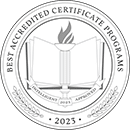
Certificate of Graduate Studies: Government
The Certificate of Graduate Studies, offered online and on campus, is a 12-credit (4 courses) graduate-level program that can enhance your graduate degree or be taken as a stand-alone graduate certificate. Both options can expand your expertise in a specialized area of government and improve your marketability. You can gain foundational knowledge and develop your critical thinking and practical skills in the field of government, relating to cybersecurity, national security, healthcare policy and more. Taught from a Christian worldview, our Certificate of Graduate Studies program is led by renowned scholars and accomplished practitioners, such as former U.S. Attorney General John Ashcroft, Rear Admiral Larry Baucom (USN, ret.), former diplomat Dr. Mary Manjikian, and past Virginia Governor Robert F. McDonnell.
- Examine the political and legal climate of policy making as it relates to foreign affairs, cybersecurity, national security, healthcare, economics, and more.
- Explore our constitutional foundation, democracy and democratization, and the biblical principles surrounding them.
- Strengthen your understanding of U.S. foreign policy, economics aspects and America’s role in the world today.
Please complete the Request Information form on this page to learn more about this program.
- Public Servant at the local, state or national level
- Non-Governmental Organization Staff
- Nonprofit Team Member
- Public Policy Researcher
- Foreign Service
- Military
| Certificate of Graduate Studies | Tuition Cost Per Credit Hour | Total Credits | Tuition Cost for Certificate |
|---|---|---|---|
| American Government | $695 | 12 | $8,340 |
| Cyber Practitioner Preparation | $695 | 9 | $6,255 |
| Cybersecurity Policy | $695 | 12 | $8,340 |
| International Relations | $695 | 12 | $8,340 |
| Law & Public Policy | $695 | 12 | $8,340 |
| Middle East Politics | $695 | 12 | $8,340 |
| National Security Studies | $695 | 12 | $8,340 |
| Political Campaign Strategies & Management | $695 | 12 | $8,340 |
| Public Administration | $695 | 12 | $8,340 |
| Terrorism & Homeland Defense | $695 | 12 | $8,340 |
Student Fees Per Semester
| University Services Fee (On-Campus Students) | $850 (Fall & Spring) $700 (Summer) |
| University Services Fee (Online Students) | $700 |
*Rates are subject to change at any time.



